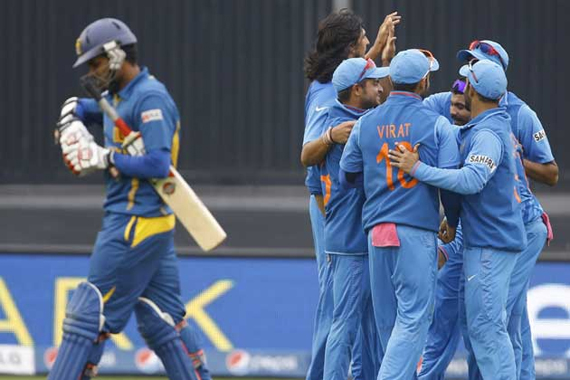
Cardiff, Jun 21: Inspired by their bowlers, India made short work of Sri Lanka in the second ICC Champions Trophy semi-final in overcast Cardiff by eight wickets with 15 overs to spare. Like the other semi-final on Wednesday at The Oval, the match turned out to be an anticlimax as the weight of expectation got to Sri Lanka. Their batting, barring skipper Angelo Mathews, was lacklustre and a total of 181 for 8 was never going to challenge India, for whom Shikhar Dhawan and Virat Kohli scored fifties.
The match was won in the first half, when in conditions heavily weighted in favour of seam bowling, India's bowlers restricted Sri Lanka to a sub-par total. No doubt having the weather forecast and conditions on his mind, and perhaps influenced by the fact that teams batting first have won just two of 11 completed ODIs at Sophia Gardens, MS Dhoni opted to field after a delayed start. It proved an excellent toss to win, and with his trio of pace bowlers finding appreciable movement off a tricky surface and Suresh Raina holding three catches at second slip, India took charge early on.
In three victories during the league stage, Bhuvneshwar Kumar had struck in his opening spell and so the start he provided in seam-friendly conditions was always going to be important. True to form, he produced a breakthrough early by having Kusal Perera (4) caught by Raina in the third over. Finding appreciable swing off the surface, Bhuvneshwar operated with a full length and beat the bat several times as well as producing a some edges.
Tillakaratne Dilshan hobbling off the field with a thigh strain midway through the fifth over left Sri Lanka struggling, and with Umesh Yadav supporting Bhuvneshwar well in good first spell (5-2-16-0) India kept the scoring on a leash. There were 75 dot balls bowled in the first 15 overs - nine of which beat the bat - at which time Sri Lanka were 36 for 1.
The early pressure from Bhuvneshwar, who reeled off nine overs for 18 at the start, was a contributory factor to Sri Lanka's problems but the innings really turned after the first drinks break. Ishant Sharma produced edges off the bats of Lahiru Thirimanne (7) and Kumar Sangakkara (17) in successive overs, both left-handers poking to Raina at second slip. The low take off Thirimanne was especially sharp.
Sri Lanka survived lbw appeals against MS Dhoni, who gave the gloves to Dinesh Karthik and took the ball for the 24th over, and Ravindra Jadeja by virtue of using the reviews, but failed to accelerate.
Mahela Jayawardene got to 38 before he missed a swipe at Jadeja and was bowled, and India tightened their grasp in the batting Powerplay by conceding just 12 runs - two maidens - in five overs. Mathews scored Sri Lanka's first boundary for an hour by heaving Yadav for four and reached his half-century in 85 balls, but one run later was out slogging at R Ashwin in the 46th over. Two quick wickets to Ashwin ensured there was no late surge and Sri Lanka ended up with a disappointing total.
Defending 181, Sri Lanka's only chance was to bowl India out but Dhawan and Rohit Sharma put on 77 in 17 overs to lay the platform for victory. Nuwan Kulasekara found a bit of movement but India's openers played out the first 15 overs after which the surface eased out.
Dhawan, dropped on 18 by Mathews at first slip off Kulasekara, continued his rich vein of form in his second coming as an ODI batsman while Rohit played a few pleasing shots in his 33. Again he failed to convert a start, but his exit to Mathews allowed Kohli to get his highest score this tournament.
Dhawan was the slowest he has been in the tournament, but reached another fifty. He was given another life on 62, this time at point off Kulasekara, and carried on to 68 before Sangakkara effected a smart stumping.
Kohli was content to play second fiddle yet still found time to drive Kulasekara inside-out for four and swat Jeewan Mendis to the midwicket boundary. Once Dhawan departed, he hurried to fifty in 58 balls and finished off the game with 58* off 64 balls.
India will now play England in the final on Sunday.





Comments
Add new comment